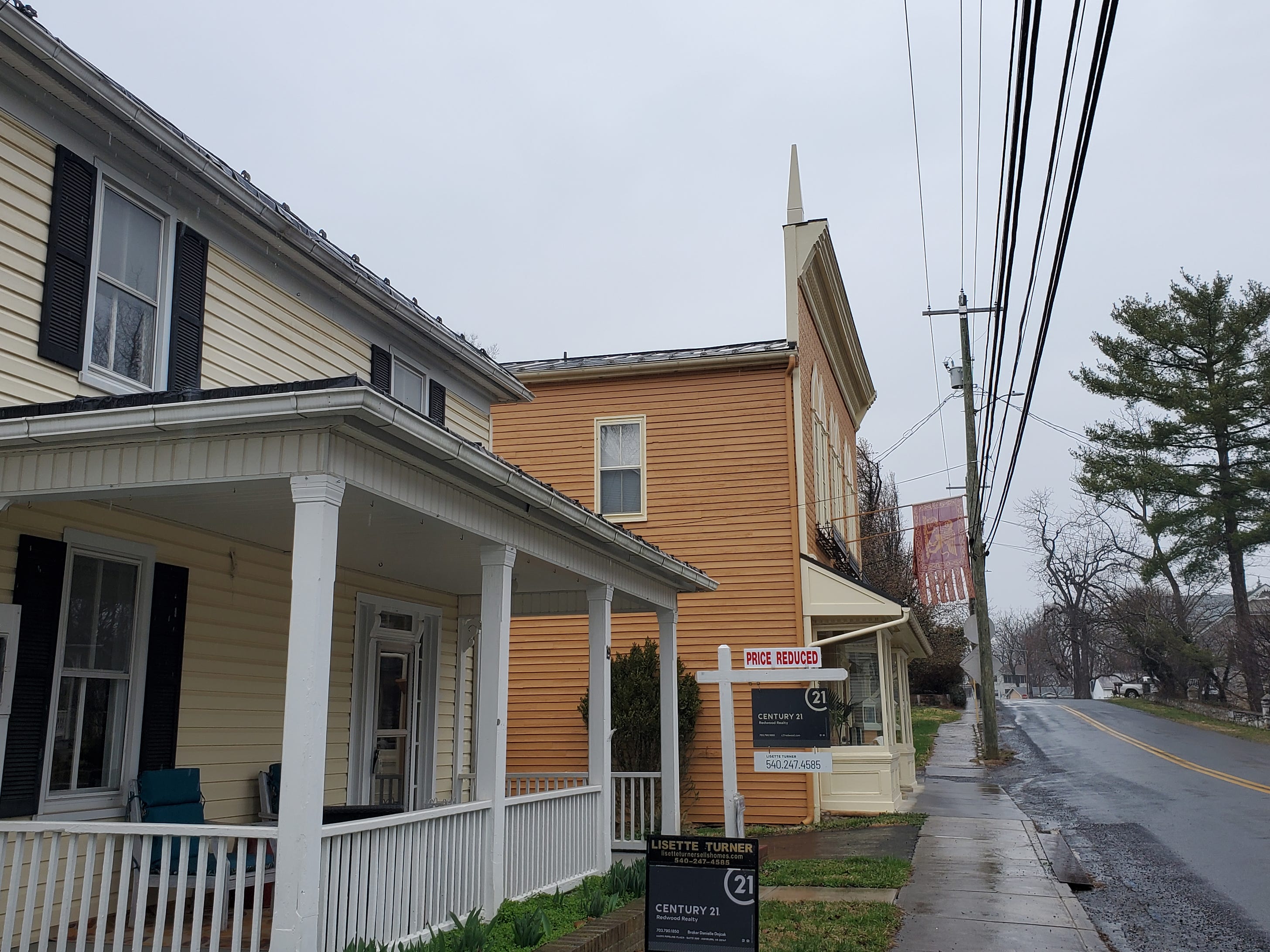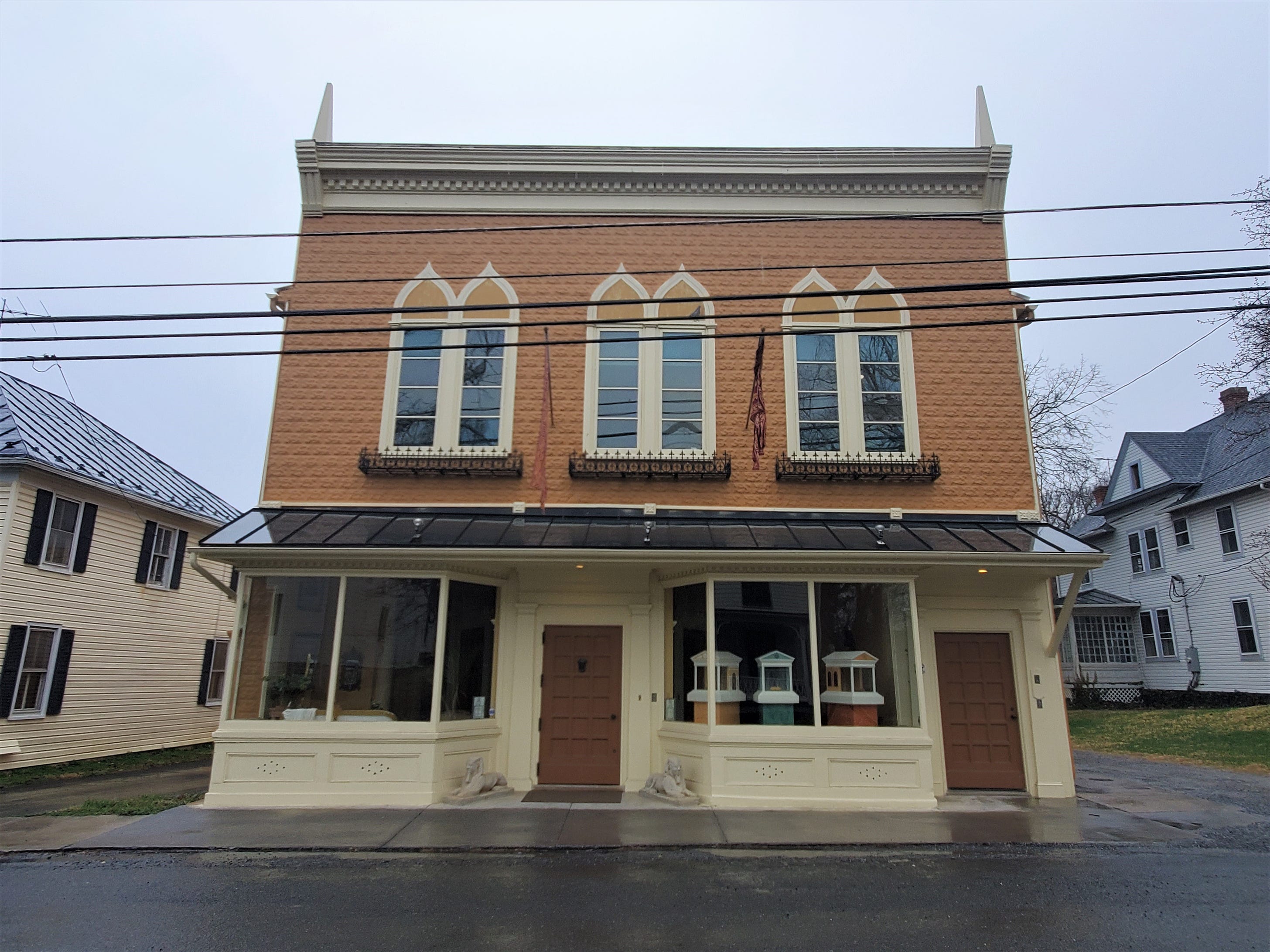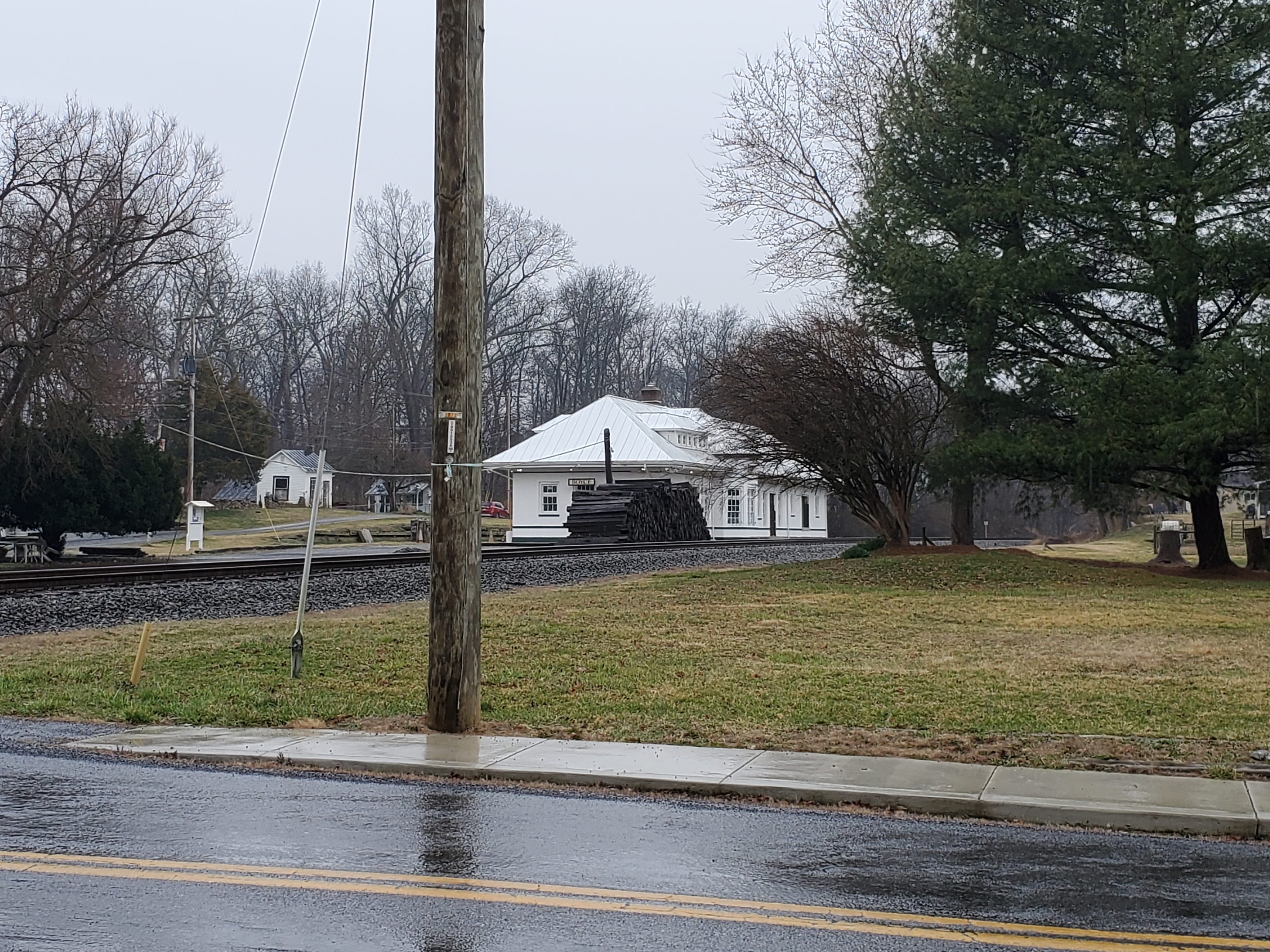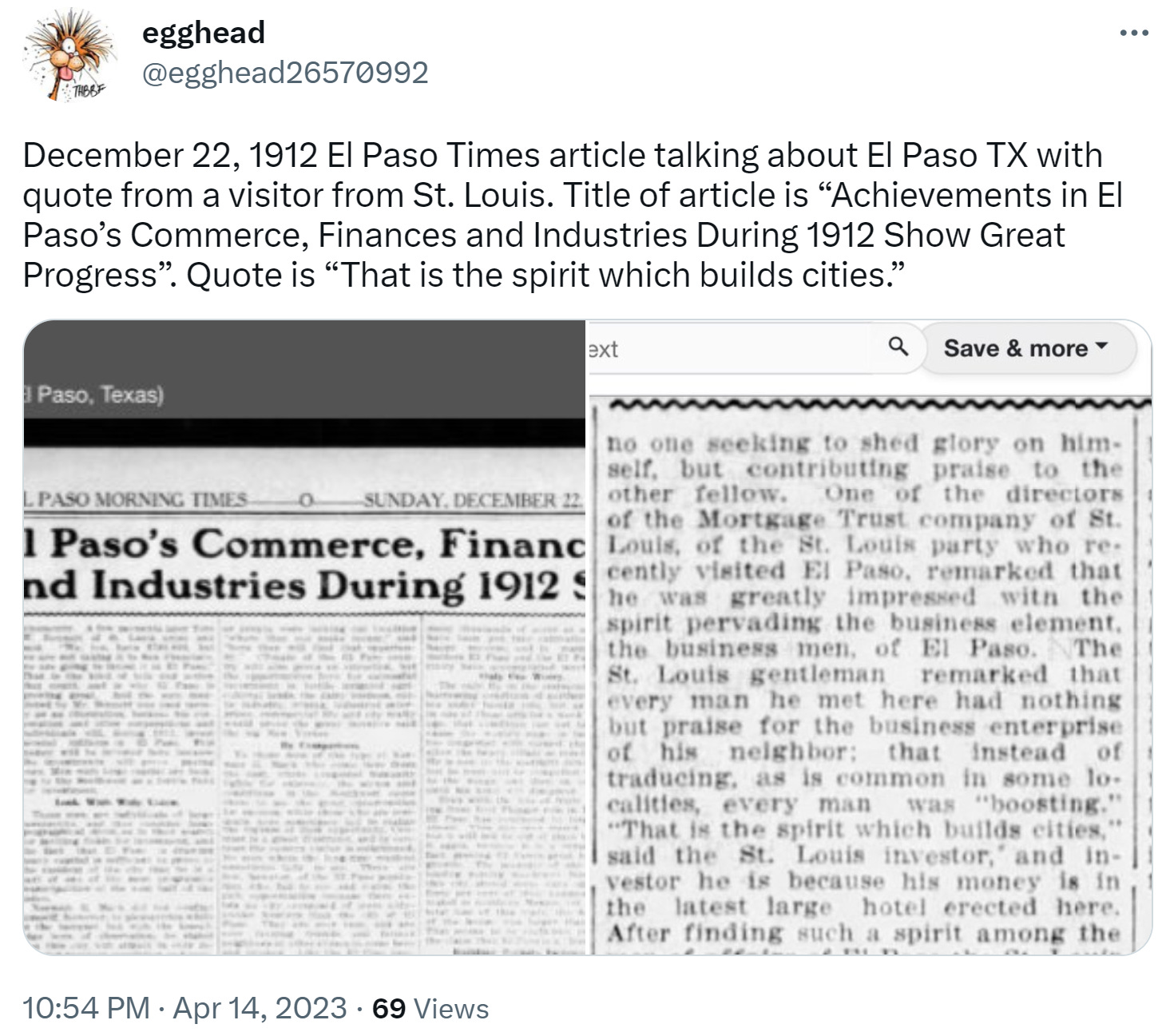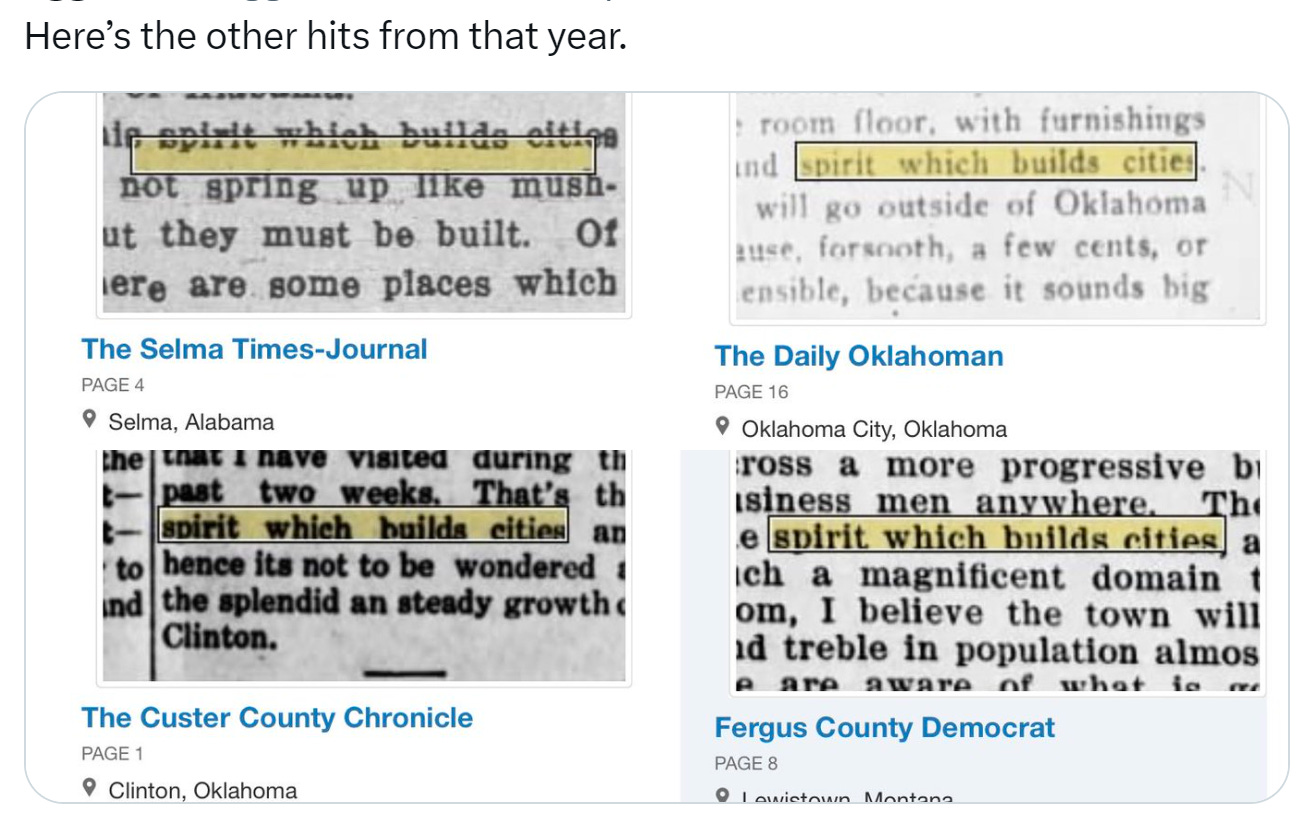The Deleted Scenes - A City's a City No Matter How Small
The other day I had a piece at Discourse Magazine, out of the Mercatus Center. I’ve made the general point before, over the years, but I think I’ve finally gotten it just right in this piece. A little preface. What inspired me to write this was a drive out to Winchester, Virginia, during which, on my ride back home, I drove through a couple of very small towns. One of them was the tiny village of Boyce, which looks like this, including this plain building with a grand parapet/false façade, and a train station. I found this very interesting: the bare outline of a city that might have been. When I got home I looked up Boyce on Wikipedia. And I found an excerpt from a fascinating—and unlinked, uncited—newspaper article from 1912. Here’s Wikipedia:
This is the spirit which builds cities. Is that a sentence anyone today would think of writing in reference to a rural village of 300 people? And would anybody living in such a settlement today agitate for a bigger train station? This was a piece of evidence proving my intuition that the way we think about towns and cities today is very ahistorical—that the largely cultural divide between “small towns” and “big cities” is basically a modern innovation. But first, I needed to confirm that the newspaper article was genuine. I searched various bits of it on Google, but no hits—either it wasn’t digitized, or it wasn’t real. So I emailed Boyce’s official email, and asked if anyone in the town hall could help me out. Someone there responded quickly, and told me that the libraries in Richmond and possibly Winchester had microfilm archives of the Clarke Courier. So I started an online chat with the main Winchester library, and their receptionist directed me to archives. I emailed archives, and they were able to point me to the Clarke County Historical Association, which had digitized archives of the Courier. (Not searchable text, just scanned images.) That was good enough. I searched for the right date—Wednesday, December 11, 1912—held my breath…and there it was! There’s something satisfying about (digitally) holding a piece of evidence in your hands that proves something almost unbelievable. And that unbelievable thing is that the desirability of growing and getting on the map was more or less taken for granted. This is the polar opposite of today’s NIMBYism. And what it shows, not just conceptually but literally, is that Boyce is not a distinct thing called a “small town”—it is, or was, the first iteration of a city. And with that I wrote this piece for Discourse.
I write, in particular, about how these became cultural distinctions, with all kinds of culture-war baggage and grievance, which obscured our urban history:
Finally:
There’s more. Read the whole thing. This single newspaper article is not an aberration. I wrote about this on Twitter, and people offered more evidence in the same direction. One person, in Springville, Utah, replied, “In 1895 my small city boasted of ‘a population increase of over 25% against any other city’s 16%. With this magnificent showing we hope incoming officers will look well to maintaining Springville’s reputation.’” Another person searched the phrase in a newspaper database and found this: Plus four more instances of that phrase, just in 1912! Now, did people debate particular projects? Did people lament changes, demolitions, traffic, crowding, etc.? I’m sure they did. Those tendencies are natural. But nonetheless, something resembling today’s YIMBYism was simply the default understanding of how human settlements worked. Of course we want a train station, and a grand one at that. Of course we want our population and economy to grow. Again, it’s almost difficult to read these old newspaper articles and not wonder if you’re being pranked. I read “December 11, 1912” over and over, making sure it didn’t really say “April 1.” That article doesn’t say, “In a surprising twist, the residents of the quiet, peaceful village of Boyce have banded together not to stop the extension of rail, but to welcome it—and, what’s more, to demand even a larger station than the railway is planning to build.” There is nothing at all to suggest that this is unusual, or anything other than obvious. That is such a departure from today’s default views on development that it makes me think I am reading about a different civilization:
We may never build in exactly this same way, because our economy is very different. And the car probably demands some changes in land use. But this old spirit is recoverable. It isn’t just about land use, per se; it’s about devolving power and scale, letting people build things and do business, letting them be stewards of and participants in their place. What we did some time in the 20th century is we outlawed this pattern, wiped out its memory, and then used that suppression as evidence that nobody wants it or mourns it anyway. It is true that cities fell deeply out of favor at that point in time. But perhaps the age of suburban sprawl will turn out to be a mistaken blip. Meanwhile, the work of urbanists is fundamentally the work of rediscovery and restoration. Related Reading: America’s Urban Heritage: Culpeper, Virginia Edition Thank you for reading! Please consider upgrading to a paid subscription to help support this newsletter. You’ll get a weekly subscribers-only post, plus full access to the archive: over 600 posts and growing. And you’ll help ensure more material like this! You're currently a free subscriber to The Deleted Scenes. For the full experience, upgrade your subscription. |
Older messages
What If You're the Placeless One?
Monday, April 24, 2023
The joy of getting to know ordinary places deeply
Old Wisdom, New Movement
Saturday, April 22, 2023
YIMBYs are forced to turn an ur-issue into a political movement
New and Old #106
Friday, April 21, 2023
Friday roundup and commentary
Being a Part of It
Thursday, April 20, 2023
Small business draws you into a place
Not Quite on Target
Wednesday, April 19, 2023
The downside of "mixed-use development" urbanism
You Might Also Like
*This* Is How To Wear Skinny Jeans Like A Fashion Girl In 2025
Wednesday, March 12, 2025
The revival is here. The Zoe Report Daily The Zoe Report 3.11.2025 This Is How To Wear Skinny Jeans Like A Fashion Girl In 2025 (Style) This Is How To Wear Skinny Jeans Like A Fashion Girl In 2025 The
The Best Thing: March 11, 2025
Tuesday, March 11, 2025
The Best Thing is our weekly discussion thread where we share the one thing that we read, listened to, watched, did, or otherwise enjoyed recent… ͏ ͏ ͏ ͏ ͏ ͏ ͏ ͏ ͏ ͏ ͏ ͏ ͏ ͏ ͏ ͏ ͏ ͏ ͏ ͏ ͏ ͏ ͏ ͏ ͏ ͏ ͏ ͏
The Most Groundbreaking Beauty Products Of 2025 Are...
Tuesday, March 11, 2025
Brands are prioritizing innovation more than ever. The Zoe Report Beauty The Zoe Report 3.11.2025 (Beauty) The 2025 TZR Beauty Groundbreakers Awards (Your New Holy Grail Or Two) The 2025 TZR Beauty
Change Up #Legday With One of These Squat Variations
Tuesday, March 11, 2025
View in Browser Men's Health SHOP MVP EXCLUSIVES SUBSCRIBE Change Up #Legday With One of These Squat Variations Change Up #Legday With One of These Squat Variations The lower body staple is one of
Kylie Jenner Wore The Spiciest Plunging Crop Top While Kissing Timothée Chalamet
Tuesday, March 11, 2025
Plus, Amanda Seyfried opens up about her busy year, your daily horoscope, and more. Mar. 11, 2025 Bustle Daily Amanda Seyfried at the Tory Burch Fall RTW 2025 fashion show as part of New York Fashion
Paris Fashion Week Is Getting Interesting Again
Tuesday, March 11, 2025
Today in style, self, culture, and power. The Cut March 11, 2025 PARIS FASHION WEEK Fashion Is Getting Interesting Again Designs at Paris Fashion Week once again reflect the times with new aesthetics,
Your dinner table deserves to be lazier
Tuesday, March 11, 2025
NY delis are serving 'Bird Flu Bailout' sandwiches.
Sophie Thatcher Lets In The Light
Tuesday, March 11, 2025
Plus: Chet Hanks reaches new heights on Netflix's 'Running Point.' • Mar. 11, 2025 Up Next Your complete guide to industry-shaping entertainment news, exclusive interviews with A-list
Mastering Circumstance
Tuesday, March 11, 2025
“If a man does not master his circumstances then he is bound to be mastered by them.” ͏ ͏ ͏ ͏ ͏ ͏ ͏ ͏ ͏ ͏ ͏ ͏ ͏ ͏ ͏ ͏ ͏ ͏ ͏ ͏ ͏ ͏ ͏ ͏ ͏ ͏ ͏ ͏ ͏ ͏ ͏ ͏ ͏ ͏ ͏ ͏ ͏ ͏ ͏ ͏ ͏ ͏ ͏ ͏ ͏ ͏ ͏ ͏ ͏ ͏ ͏ ͏ ͏ ͏ ͏ ͏ ͏ ͏
Don't Fall for This Parking Fee Scam Text 🚨
Tuesday, March 11, 2025
How I Use the 'One in, One Out' Method for My Finances. You're not facing any fines. Not displaying correctly? View this newsletter online. TODAY'S FEATURED STORY Don't Fall for the
